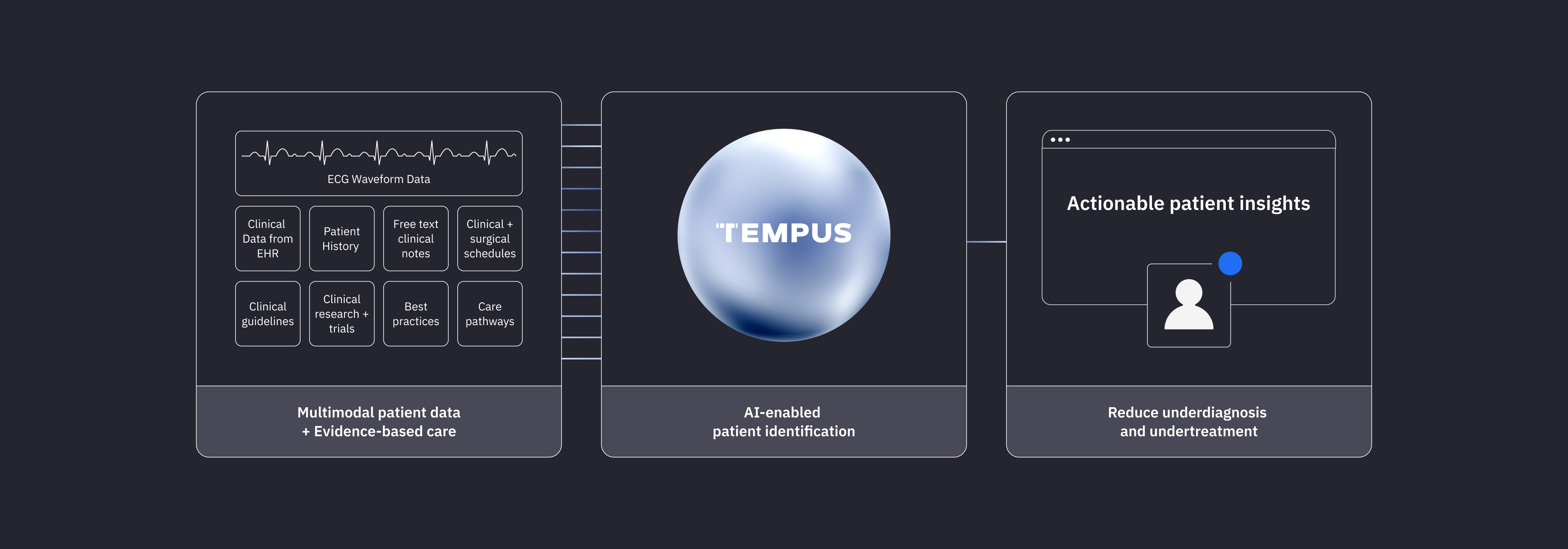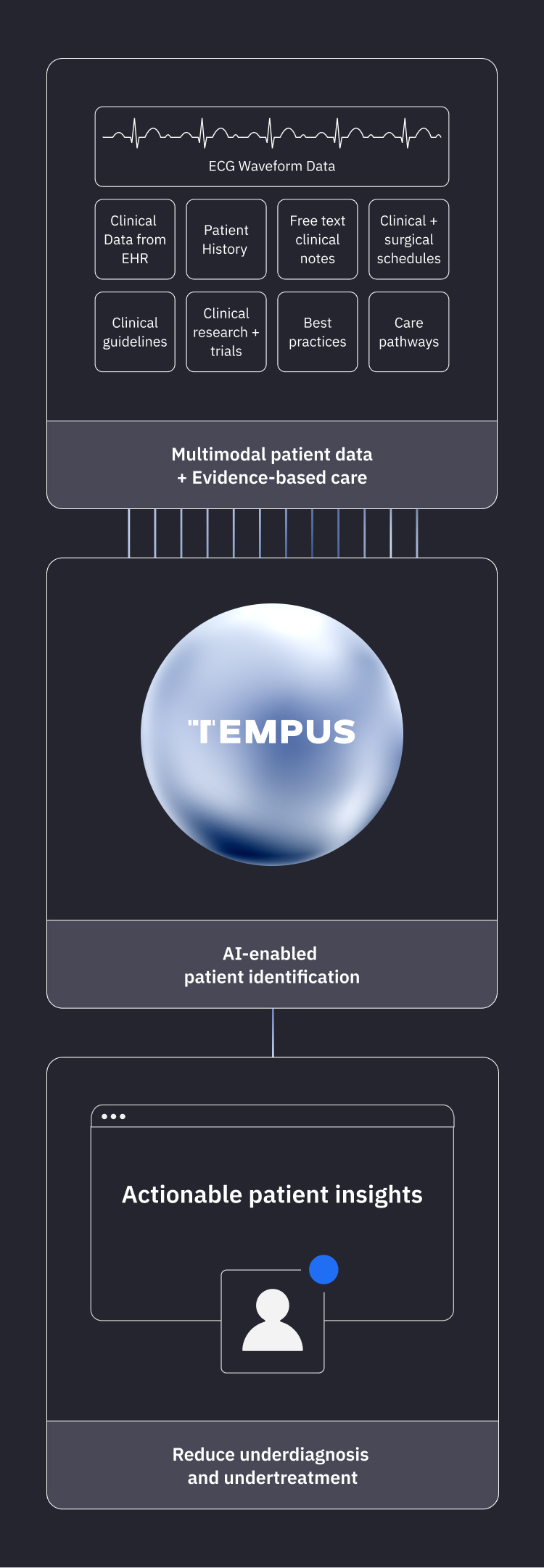-
PROVIDERS
Watch now
Are you getting the full picture? A webinar series on the power of comprehensive intelligent diagnostics
-
LIFE SCIENCES
REGISTER NOW
Closing Care Gaps with AI: The Next Competitive Edge in Pharma
Monday, July 14
9am PT, 11am CT, 12pm ET -
PATIENTS
It's About Time
View the Tempus vision.
- RESOURCES
-
ABOUT US
View Job Postings
We’re looking for people who can change the world.
- INVESTORS
Tempus Cardiology
AI-enabled solutions to help providers close care gaps for patients who may have undiagnosed and undertreated cardiovascular disease.


Our Impact
-
60+
algorithms to identify potential care gaps across 15 cardiovascular diseases
-
~2M
patients screened
-
50K+
patients screened per month
-
100+
hospitals nationwide are currently powered by Tempus Next

Solutions to help identify your patients
Underdiagnosed patients
Tempus accelerates cardiac care with AI-powered solutions to identify potentially undiagnosed patients.
ECG-AI
ECG-AI devices integrate with advanced cardiology algorithms to detect signs of disease and notify care teams for patient follow up.
Learn morePixel for Radiology
Advanced viewing and automated reporting of cardiac MR images help improve efficiency and accuracy in flow visualization and quantification, functional analysis, and tissue characterization.
Learn moreUndertreated patients
Tempus empowers clinicians to deliver the next step in a patient’s care journey with our AI-enabled care pathway intelligence platform.
Tempus Next
60+ algorithms to identify potential care gaps across 15 cardiovascular diseases including aortic stenosis, mitral regurgitation, congestive heart failure, abdominal aortic aneurysms and more.
Learn more-
UPCOMING WEBINAR:
Tempus Receives U.S. FDA 510(k) Clearance for Tempus ECG-AF, an AI-based Algorithm that Identifies Patients at Increased Risk of AFib
Tempus AI, Inc. (NASDAQ: TEM), a leader in artificial intelligence and precision medicine, today announced it has received 510(k) clearance from the U.S. Food and Drug Administration (FDA) for its Tempus ECG-AF device that uses AI to help identify patients who may be at increased risk of atrial fibrillation/flutter (AF).
Link -
UPCOMING WEBINAR:
New CMS Decision Provides Medicare Coverage for the Clinical Use of the Tempus ECG-AF Device
Tempus AI, Inc. (NASDAQ: TEM), a technology company leading the adoption of AI to advance precision medicine and patient care, today announced the impact of a new decision by the Centers for Medicare and Medicaid Services (CMS) that will allow reimbursement for assessments of cardiac dysfunction using the Tempus ECG-AF algorithm.
Link -
UPCOMING WEBINAR:
Tempus and Northwestern Medicine Announce Collaboration to Bring Practical Application of AI to Healthcare
Tempus, a leader in artificial intelligence and precision medicine, and Northwestern Medicine, Chicago’s premier integrated academic health system, today announced a collaboration that aims to explore the application of artificial intelligence in clinical care and research.
Link -
UPCOMING WEBINAR:
Tempus Announces Collaboration with United Therapeutics to Study Use of AI to Detect Patients at Risk for Pulmonary Hypertension
Tempus AI, Inc. (NASDAQ: TEM), a leader in artificial intelligence and precision medicine, today announced a new collaboration with United Therapeutics (UT), a leading biotechnology company focused on providing a brighter future for patients through the development of novel pharmaceuticals and technologies.
Link
Our Science
view all-
UPCOMING WEBINAR:
Deep neural networks can predict new-onset Atrial Fibrillation from the 12-lead ECG and help identify those at risk of Atrial Fibrillation-related stroke
Atrial fibrillation (AF) is associated with substantial morbidity, especially when it goes undetected. If new-onset AF can be predicted, targeted screening could possibly be used to find it early. In this study, we explore if a deep neural network can predict new-onset AF from the resting 12-lead ECG and study whether this prediction may help identify those at risk of AF-related stroke.
Read more -
UPCOMING WEBINAR:
rECHOmmend: An ECG-based machine learning approach for identifying patients at increased risk of undiagnosed structural heart disease detectable by Echocardiography
In this study, we developed a novel ECG-based machine learning approach to predict multiple structural heart conditions, hypothesizing that a composite model would yield higher prevalence and positive predictive values to facilitate meaningful recommendations for echocardiography.
Read more -
UPCOMING WEBINAR:
Prospective evidence generation via ECG-AID Study
We have launched a multi-site prospective study with our beta partners to test our algorithms for atrial fibrillation and structural heart disease. The study is called ‘ECG-AID’ and is expected to enroll 600-1,000 patients to validate prospective performance across multiple patient populations and data systems.
Read more -
UPCOMING WEBINAR:
Machine learning analysis including social determinants of health for prediction of mortality following Transcatheter Aortic Valve Implantation: a single center experience
Social Determinants of Health are increasingly being recognized as critical, independent prognosticators in cardiovascular disease. In this study, we explore if our ML model provides a holistic picture of mortality prediction to understand the role in care following TAVI.
Read more -
UPCOMING WEBINAR:
Racial and Echocardiographic predictors of all-cause mortality in patients with moderate Tricuspid Regurgitation: a single center study
This study assessed transthoracic echocardiography (TTE), clinical and socioeconomic (SES) factors as predictors of progression from moderate to severe tricuspid regurgitation (TR) and showed that race/TTE indices offer insights into personalized management of patients with moderate TR.
Read more -
UPCOMING WEBINAR:
Enhanced detection of Heart Valve Disease using integrated artificial intelligence at scale
This study explores our platform that uses a rules-based algorithm to search EHRs for heart valve disease among patients treated by healthcare systems in the US to help provide a solution.
Read more -
UPCOMING WEBINAR:
ML-based cluster analysis of patients with significant TR reveals distinct population with different phenotypes and clinical outcomes
In this Alan S. Pearlman Research Award Winning analysis, we uncover that significant TR is associated with considerable risk of clinical outcomes, and that a ML-based approach to identify phenogroups may aid in the timing and selection of therapy.
Read more -
UPCOMING WEBINAR:
Machine learning analysis of progression from moderate to severe Tricuspid Regurgitation
This study assessed echocardiographic (Echo) and demographic predictors of moderate TR progression using Natural Language Processing (NLP) to further support that insights from NLP can help to improve the performance of disease prediction.
Read more -
UPCOMING WEBINAR:
FDA grants breakthrough device designation to Tempus’ Atrial Fibrillation ECG Analysis Platform, developed in collaboration with Geisinger
Tempus announced the U.S. FDA has granted Breakthrough Device Designation for its ECG Analysis Platform. Developed in collaboration with Geisinger, it aids clinicians in identifying patients at increased risk of developing atrial fibrillation (AFib) or atrial flutter.
Read more
Partnering with Tempus is investing in the future
We believe that AI-enabled solutions can help shorten the diagnostic odyssey and improve the lives and outcomes of patients with cardiovascular disease.